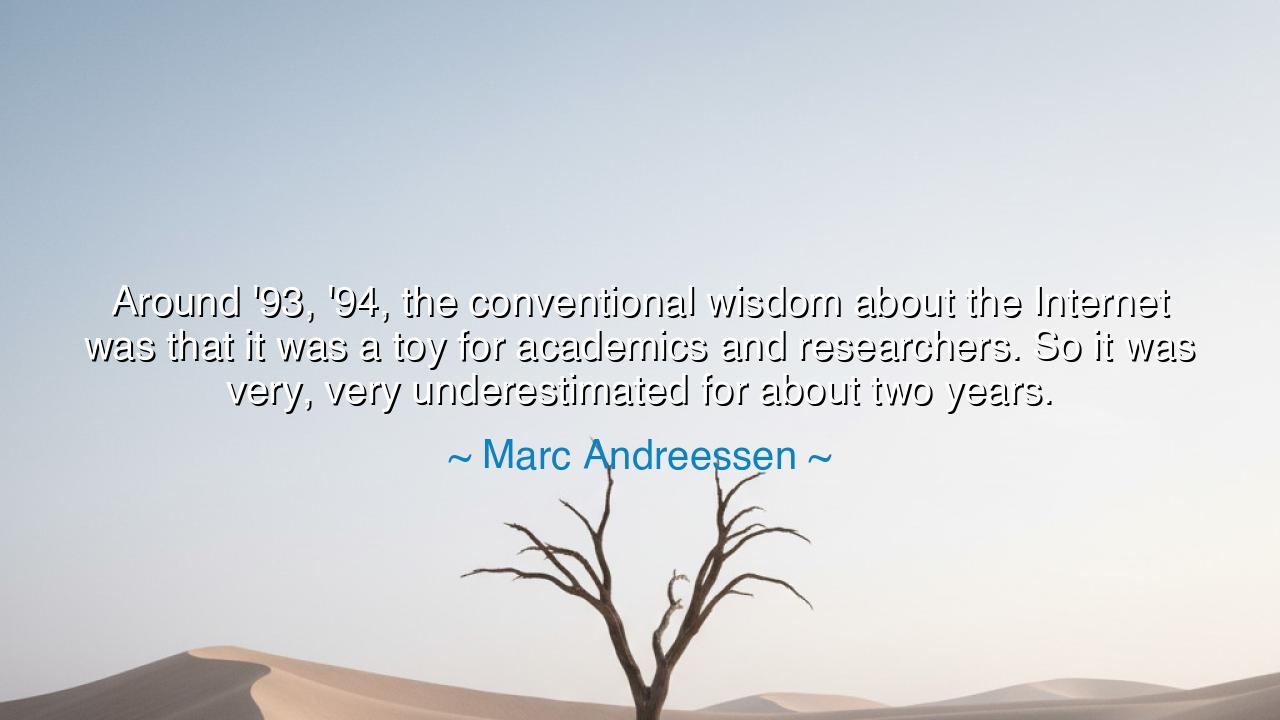
Around '93, '94, the conventional wisdom about the Internet was
Around '93, '94, the conventional wisdom about the Internet was that it was a toy for academics and researchers. So it was very, very underestimated for about two years.






Hearken, O children of foresight, to the reflection of Marc Andreessen, who recounts the early days of the Internet, when the world beheld it not as a force of transformation, but as a mere toy for academics and researchers. He observes that its power and potential were underestimated for years, cloaked in skepticism and doubt. Herein lies a teaching for the ages: true innovation often arises where conventional thought sees only triviality, and the vision of the few may illuminate paths unseen by the many.
The origin of this insight is rooted in the early 1990s, when Andreessen, a pioneering software engineer, witnessed firsthand the rise of the digital realm. At that time, the Internet was confined to laboratories and universities, its reach limited and misunderstood by the broader world. Yet those who discerned its potential—its ability to connect minds, commerce, and knowledge across the globe—recognized that its underestimation was but the blindness of the present, not the limits of the future.
The meaning of this aphorism is profound: societies often fail to perceive the magnitude of emerging forces, dismissing them as inconsequential or academic. The Internet, like many revolutionary tools before it, held within it a power that would reshape trade, communication, and culture. Andreessen’s observation reminds us that innovation frequently lurks beneath the veil of skepticism, and that foresight and courage are required to recognize and cultivate it.
History offers parallels to this lesson. Consider Johannes Gutenberg, whose printing press in the fifteenth century was initially met with doubt, seen as a curious mechanism rather than a world-altering invention. Yet in time, it unleashed a flood of knowledge, transformed education, and reshaped societies. Like the early Internet, Gutenberg’s press was underestimated, but its ultimate impact proved the vision of those who discerned its potential.
Moreover, this teaching extends to all who seek to perceive what lies beyond the conventional. The visionary must often confront doubt, misunderstanding, and even ridicule, recognizing that wisdom and progress do not always align with prevailing opinion. Andreessen’s words counsel patience, courage, and attention to the subtle currents of innovation, where seeds of transformation lie waiting to be nurtured.
O generations yet unborn, take this counsel into your hearts: do not be constrained by the conventional wisdom of the moment. Observe closely, think boldly, and perceive the potential hidden in what others deem trivial. For in the overlooked and underestimated lies the power to reshape worlds, to connect humanity, and to awaken forces that endure far beyond the limits of present imagination.






DTDao Trang
This statement highlights the recurring theme of underappreciated innovation. It makes me reflect on what qualities allowed some individuals to see the Internet’s potential despite widespread skepticism. Was it experience, curiosity, risk tolerance, or simply a willingness to challenge conventional wisdom? Furthermore, it prompts a forward-looking question: which technologies or ideas today are being underestimated, and how might early recognition or dismissal shape their impact on society in the next decade?
LPLinh Pham
I’m curious about the implications for education and technological literacy. If the Internet was underestimated by conventional wisdom, are students and professionals today equipped to recognize emerging tools with similar disruptive potential? How can society cultivate foresight and adaptability to avoid repeating such underestimations? This also raises the question of hindsight bias: once a technology becomes indispensable, people forget how uncertain its early value seemed, skewing our understanding of innovation timelines.
KLKha Le
This quote prompts me to consider how early perceptions influence funding and development. Did underestimating the Internet delay its adoption, or did it create opportunities for visionary entrepreneurs to gain an advantage? I also question the psychological and social factors that make people dismiss new tools as irrelevant or trivial. How can innovators challenge prevailing conventional wisdom effectively, and what strategies help bridge the gap between early potential and widespread recognition?
GDGold D.dragon
Reading this, I’m intrigued by the speed at which underestimated technologies can reshape industries. Was the early underestimation of the Internet due to a failure of imagination, or were there practical reasons for skepticism at the time? I also wonder about the role of infrastructure, access, and user adoption in transforming something perceived as a niche tool into a ubiquitous platform. How might similar dynamics apply to emerging technologies like AI, blockchain, or quantum computing today?
DNDoan Ngoc
I find this perspective fascinating because it highlights the unpredictability of innovation. How did perceptions of the Internet shift so quickly from academic novelty to global necessity? What lessons can entrepreneurs and investors draw about recognizing value before mainstream acceptance? Additionally, does this suggest that conventional wisdom is often a poor guide for forecasting transformative change, and how can society develop mechanisms to better identify disruptive technologies early on?